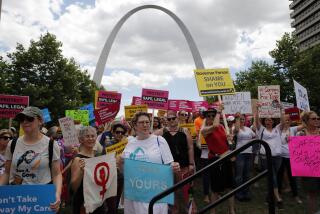Gay marriage foes may win right to defend Prop. 8 in court
Reporting from San Francisco — The California Supreme Court appeared ready Tuesday to rule that the backers of Proposition 8 and other ballot measures have the right to defend them in court, a stance that would give opponents of same-sex marriage the chance to champion the initiative all the way to the U.S. Supreme Court.
During an hour of oral arguments, several justices appeared skeptical that only elected state officials may defend measures passed by voters, as gay-rights lawyers claimed.
If that were the case, same-sex marriages would resume in California because Gov. Jerry Brown and Atty. Gen. Kamala D. Harris have refused to appeal last year’s federal ruling against Proposition 8.
Justice Ming W. Chin observed that the power of the people to enact laws would be curtailed if initiatives could be blocked in court every time officials refused to defend them.
“So the attorney general and the governor get to pick the laws they want to enforce?” asked Chin, a conservative on the court.
Justice Joyce L. Kennard, one of the court’s more liberal members, appeared to agree. Denying initiative sponsors the right to appeal, she said, would be “nullifying the great power that the people have reserved for themselves” and “would not promote principles of fundamental fairness.”
“What we are going to hold is not limited to gay issues,” Kennard said. “Our holding will apply to any other circumstance when proponents of initiatives are asserting standing” — the legal term for the right to bring a case in court.
The seven-member court will decide within 90 days whether ProtectMarriage, the sponsors of Proposition 8, have the right to represent the state in litigation. That ruling will clear the way for the U.S. 9th Circuit Court of Appeals to decide whether ProtectMarriage had standing to appeal U.S. District Judge Vaughn R. Walker’s ruling against the 2008 ballot measure.
During a hearing in December, a three-judge panel of the 9th Circuit appeared inclined to rule Proposition 8 unconstitutional if standing could be resolved. The 9th Circuit asked the California Supreme Court to clarify state law on that point.
During Tuesday’s hearing, Chief Justice Tani Cantil-Sakauye suggested that there would be no one to “safeguard the precious power” of citizen initiatives if their sponsors were not allowed to defend them.
“Doesn’t that make the initiative process illusory?” she asked.
Justice Carol A. Corrigan pointed out that the courts, not the governor or the attorney general, are supposed to decide a law’s constitutionality. She asked whether elected officials have “pocket vetoes” over voters.
The state high court has long allowed sponsors to defend ballot measures, but has never before ruled on whether they have an automatic right to do so.
Charles J. Cooper, representing ProtectMarriage, told the court that initiative sponsors represent the state, especially “when state executive officials have refused to do their duty.”
But Theodore B. Olson, a lawyer for two same-sex couples challenging Proposition 8, argued the California Constitution gives only state officials the right to represent the people in court, and state officials have the right to act as a check on the people’s power.
Justice Kathryn Mickle Werdegar suggested the California high court could avoid making a specific rule and simply write a decision that explained the practice of permitting initiative sponsors to intervene in court cases. Allowing both state officials and initiative sponsors to represent California could spark confusion, she implied.
“Can there be two entities that represent the state in federal court?” she asked.
Justice Marvin R. Baxter indicated that would pose no problem. “There need not be one unified message,” Baxter said.
Justice Goodwin Liu, a UC Berkeley law professor sworn in last week as the court’s newest justice, asked several questions that showed a close reading of the briefs. He said it seemed as though the California court was being asked to rule on an issue that had relevance only for the federal courts.
The case could reach the U.S. Supreme Court next year.
More to Read
Sign up for Essential California
The most important California stories and recommendations in your inbox every morning.
You may occasionally receive promotional content from the Los Angeles Times.











